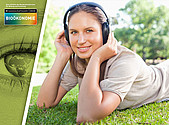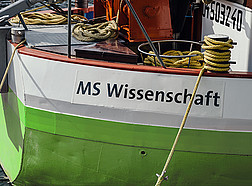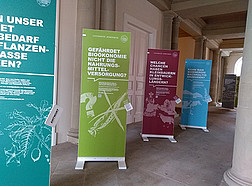In the Science Year 2020|21 - Bioeconomy, the exhibition ship MS Wissenschaft is touring Germany on behalf of the Federal Ministry of Education and Research. On board the MS Wissenschaft, you will gain insights into the bioeconomy, the sustainable form of economic activity that relies on renewable resources. Microorganisms and raw material cycles, new active ingredients from nature, food of the future, and political and social questions that arise on the way to a bio-based economy. Various exhibits from science and research invite you to discover, try things out, and participate.
On board the MS Wissenschaft is the exhibit “New Products from Bio-Waste" from the Department of Conversion Technologies of Biobased Resources at the University of Hohenheim. It deals with the question "How can products be manufactured from renewable raw materials without competing with food cultivation?” We can now make many products from plants instead of from oil or coal. But when we produce clothing, food storage containers, computer cases, furniture parts, medicines, and materials for batteries with biological substances, a new problem arises. Areas on which these are cultivated are no longer available for our food. But there is a way out: We can use the non-edible byproducts of the food. And the more food is produced, the more of this bio-waste is available. As long as we use the resulting products, they store carbon. If these are burned in the end, they only release as much carbon dioxide (CO2) as the plants have absorbed before to grow - they are therefore CO2-neutral.
The ship tour starts in Münster on 30 July. From there, the ship first heads for the Ruhr area and via the Rhine and Main to Franconia, then via the Danube to Straubing. This year's tour ends there on 17 October. In total, MS Wissenschaft will visit 19 cities.
Information and up-to-date news on dates: https://ms-wissenschaft.de/
Opening event and start of the exhibition on 30 July 2020
| Exhibition | 30 July - 17 October 2020 | 10 a.m. - 1:30 p.m. and 2:30 - 7 p.m. | |
| Public event | Free admission | No registration | Limited number of participants | handicapped accessible | Tour plan | |
The exhibition is closed daily from 1:30 - 2:30 p.m. for thorough cleaning. Contact person for the exhibit at the University of Hohenheim: Prof. Dr. Andrea Kruse, Department of Conversion Technologies of Biobased Resources |
 Super-capacitors are energy storage devices that play an important role in electric mobility. Their starting materials can be produced from biomass - and the result is even superior to conventional materials. Muhammad Jamal Alhnidi from the Department of Conversion Technologies of Biobased Resources at the University of Hohenheim will explain why this is the case and how the conversion works in the month with the theme “mobility.”
Super-capacitors are energy storage devices that play an important role in electric mobility. Their starting materials can be produced from biomass - and the result is even superior to conventional materials. Muhammad Jamal Alhnidi from the Department of Conversion Technologies of Biobased Resources at the University of Hohenheim will explain why this is the case and how the conversion works in the month with the theme “mobility.”
Length: approx. 20 minutes | Click here to listen!
Podcast | Tuesday, 1 September 2020 | |
STADTRADELN is a competition in which the aim is to cycle as many everyday routes as possible in a climate-friendly way for 21 days. For many decades, the car was the most relevant type of transportation in the mobility sector. This must change in order to reduce traffic-related environmental damage! Since the changing traffic behavior begins in the mind, the topic of bicycle traffic should be made more present in public discourse. To this end, STADTRADELN is creating state-wide and local communication events in the municipalities.
The state capital Stuttgart will be participating in STADTRADELN from 7 September to 27 September 2020. Everyone who lives, works, belongs to an association, or attends a university or school in the state capital Stuttgart can take part in STADTRADELN. The University of Hohenheim is also organizing a team.
| Action Days City Cycling | 07 - 27 September 2020 | Team University of Hohenheim | |
| Public event | Further information (internal page) | With registration | |
Event organizer: Klima-Bündnis der europäischen Städte mit indigenen Völkern der Regenwälder | Alianza del Clima e.V. Contact: Volker Schmid, Bicycle Representative of the University of Hohenheim, email |
In this online discussion, three (junior) scientists each present their field of research, and finally, in a moderated conversation, they exchange information and answer questions that the audience has asked in the chat.
During the Science Slam Talks in the Science Year 2020|21 - Bioeconomy, the House of Science Braunschweig will get to the bottom of many questions and facts in live streams. Prejudices will be dispelled, knowledge will be conveyed, and exciting fields of research in the bioeconomy will be presented. Here, science slammers and those who want to become science slammers are invited to talk about what they are doing outside of the competitions. This involves research on processes and sustainable products or social questions and answers that a bioeconomy brings with it. Markus Götz, a doctoral student at the Department of Conversion Technologies of Biobased Resources at the University of Hohenheim, will also be taking part in the project.
| Science Slam Talks #2 | 10 September 2020 | 6 - 7 pm | |
| Public event | Live streaming on YouTube | Free of charge | |
Event organizer: Haus der Wissenschaft Braunschweig GmbH Contact: Vanessa Krogmann, Email Further information about the Science Slam Talks: https://www.hausderwissenschaft.org/projektvielfalt/science-slam-talks.html?ADMCMD_editIcons=176; |
 Bioenergy complements other renewable energies such as wind or water power in terms of the bioeconomy. For example, scientists at the University of Hohenheim are investigating how biogas plants can be made more efficient. They are also looking into how fibers or raw materials for plastics can be produced in addition to biogas. Dr. Hans Oechsner from the State Institute of Agricultural Engineering and Bioenergy at the University of Hohenheim explains how this works.
Bioenergy complements other renewable energies such as wind or water power in terms of the bioeconomy. For example, scientists at the University of Hohenheim are investigating how biogas plants can be made more efficient. They are also looking into how fibers or raw materials for plastics can be produced in addition to biogas. Dr. Hans Oechsner from the State Institute of Agricultural Engineering and Bioenergy at the University of Hohenheim explains how this works.
Length: approx. 20 minutes | Click here to listen!
Podcast | Tuesday, 15 September 2020 | |
FUTURE LABS - Redesigning Life
Should we really want what we know?
Interactive lectures, experiments, and teamwork
This online course provides insights into the visions for our future from the perspective of science, business, and society. By actively participating in experiments designed by our experts, you can experience and understand the process of implementing innovative concepts.
Target group: Bachelor’s and Master’s students
| 21 - 23 September 2020 | University of Hohenheim | |
| Not a public event | Charge for participation | Limited number of participants | Registration required | |
Event organizer: University of Hohenheim Contact: Nicole Henninger (email) Application until 5 June 2020 at: https://humboldt-reloaded.uni-hohenheim.de/hrsummerschool2020 Language: English |
The 3rd International Bioeconomy Congress Baden-Württemberg 2020 is an interdisciplinary and transdisciplinary gathering for experts and stakeholders. With the title “The Bioeconomy’s Contribution to the Green Deal,” it will address the question of how innovative products, processes, and principles as well as regional cycles can contribute to mitigating climate change, reducing pollution, supporting resource efficiency, and further sustainability goals.
Online Congress with virtual industry exhibition | Monday, 21 and Tuesday, 22 September 2020 University of Hohenheim | |
| Limitation of participation | Congress homepage | |
Event organizer: Cooperation partners: Language: English |
 Almost two million tons of dry sewage sludge are disposed of annually in Germany from municipal sewage treatment plants alone. Even though it contains a lot of vital phosphate, it is useless as a fertilizer and problematic in terms of hygiene. At the same time, agriculture is in urgent need of new sources of phosphorus: The large phosphate mines are increasingly exhausted or polluted. Gero Becker from the Department of Conversion Technologies of Biobased Resources at the University of Hohenheim explains how sewage plant waste can be made usable: cheap and free of pollutants.
Almost two million tons of dry sewage sludge are disposed of annually in Germany from municipal sewage treatment plants alone. Even though it contains a lot of vital phosphate, it is useless as a fertilizer and problematic in terms of hygiene. At the same time, agriculture is in urgent need of new sources of phosphorus: The large phosphate mines are increasingly exhausted or polluted. Gero Becker from the Department of Conversion Technologies of Biobased Resources at the University of Hohenheim explains how sewage plant waste can be made usable: cheap and free of pollutants.
Length: approx. 20 minutes | Click here to listen!
Podcast | Tuesday, 29 September 2020 | |




